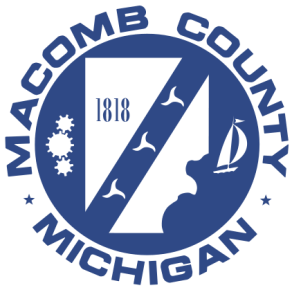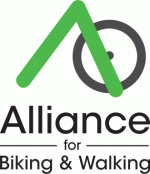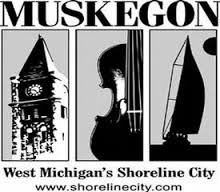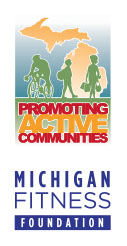You are currently browsing League of Michigan Bicyclists’s articles.
 FOR IMMEDIATE RELEASE: June 20, 2014
FOR IMMEDIATE RELEASE: June 20, 2014
MOUNT CLEMENS, The Macomb County Board of Commissioners passed a Complete Streets resolution on June 19, which promotes a safe and efficient network of public streets.
Through this policy, public streets will be more accessible to bicyclists, pedestrians, motorists and public transit by approaching all future transportation projects with the Complete Streets Policy in mind. This means the planning, design and construction of public streets will not just be automobile-centric. Rather, standards to review and implement aspects of complete streets will be adopted, with projects near public service areas and institutions being prioritized to best enhance the health, safety and general welfare of Macomb County residents.
Complete Streets based projects may include, but are not limited to, adding bike lanes, curb ramps, making crossing times longer or adding tactile and audible signs.
The Board adopted this policy to not only encourage a better standard of living for Macomb County residents, but to also continue pursuing environmentally sustainable and economically efficient infrastructure projects.
“I am proud to see this policy come to fruition after years in the making,” Board Chair Dave Flynn said. “This policy is a step forward in improving the quality of life and embracing all modes of transportation in Macomb County.”
This policy was created through a collaboration between the Board of Commissioners, the Macomb County Roads Department and the Macomb County Department of Planning and Economic Development.
In 2010 then Gov. Jennifer Granholm enacted a law requiring for a Complete Streets policy to be created at the state level. The Michigan Department of Transportation completed this policy in July of 2012.
###
 Earlier this month, Federal Highway Administration (FHWA) announced support for two guidelines, which can help communities, especially more urban ones, plan and design safe and convenient facilities for those who walk and/or bike.
Earlier this month, Federal Highway Administration (FHWA) announced support for two guidelines, which can help communities, especially more urban ones, plan and design safe and convenient facilities for those who walk and/or bike.
In the recent memorandum, the FHWA encourages its division throughout the nation to consider relying upon The National Association of City Transportation Officials (NACTO) Urban Bikeway Design Guide and the Institute of Transportation Engineers (ITE) Designing Urban Walkable Thoroughfares.
These guides build upon The American Association of State Highway and Transportation Officials (AASHTO) “green book”, which is the primary national resources for planning, designing, and operating bicycle and pedestrian facilities.
“The FHWA’s support for the NACTO guidelines gives communities and our state DOT an additional toolkit to help them provide safe and effective infrastructure that better serves bicyclists.” said John Lindenmayer, Advocacy & Policy Director for the League of Michigan Bicyclists. “Providing safe bicycle infrastructure that connects people to places goes along way to improve a bicyclists’ comfort level and overall feeling of safety on the road. These innovative bikeways certainly can play a big role in increasing ridership, which in and of itself, can help reduce the number of bicycle crashes within a community. It’s a win-win. This is an exciting opportunity for Michigan communities and LMB strongly encourages road agencies across the state to incorporate these design standards where appropriate.”
NACTO, which is an association of 15 major US cities (including Detroit) formed to exchange transportation ideas, insights, and practices and cooperatively approach national transportation issues, has published two editions of its bikeway design guide with with another edition set to be released on September 23, 2013. Unlike AASHTO’s more traditional guide, NACTO’s include protected bicycle lanes and other innovative best practices.
The FHWA memorandum also highlighted Michigan as a case study to illustrate use of treatments illustrated in the NACTO Guide by State or local DOTs:
Example 1: Michigan DOT’s Buffered Bike Lanes
One of the innovative bicycle facilities discussed in the NACTO Urban Bikeway Design Guide is buffered bike lanes. Buffered bike lanes create more space between motor vehicles and bicycles by delineating extra space between the bike lane and parked cars and/or a motor vehicle lane. Buffered bike lanes can be implemented if the pavement markings and channelizing devices are compliant with the MUTCD (see Bicycle Facilities and the Manual on Uniform Traffic Control Devices). Michigan DOT developed a video that describes their efforts to install buffered bike lanes in Oakland County (see Northwestern Highway Bicycle Lane: A Safer Place to Ride). Michigan DOT also developed a brochure that explains buffered bike lanes to the public (see What Every Michigan Driver Should Know About Bike Lanes).
 SEMCOG, a Michigan Complete Streets Coalition partner, is currently teaming up with MDOT on a regional nonmotorized plan for their seven county region, including Livingston, Macomb, Monroe, Oakland, St. Clair, Washtenaw, and Wayne Counties.
SEMCOG, a Michigan Complete Streets Coalition partner, is currently teaming up with MDOT on a regional nonmotorized plan for their seven county region, including Livingston, Macomb, Monroe, Oakland, St. Clair, Washtenaw, and Wayne Counties.
This planning process includes:
- Collection of all nonmotorized plans for the region (as well as nonmotorized components in Master Plans, Area Plans, Recreation Plans, Complete Streets Plans, etc);
- Digitization of all existing and proposed on-road and off road bicycle facilities into GIS data formats;
- A gap analysis for bike facilities and conceptual plan;
- Public involvement workshops and surveys; and
- A final plan with priority corridors for MDOT facilities and next steps for other road agencies.
To learn more about this regional nonmotorized plan and opportunities to provide public input, please visit SEMCOG’s nonmotorized page.
 Wednesday, September 25, 2013
Wednesday, September 25, 2013
2:00 PM to 3:00 PM eastern
Register online here
Cross-sector coalitions are powerful tools when working to pass and implement a state or local Complete Streets policy. By building partnerships with transit advocates, health stakeholders, economic development groups, environmental organizations and more, biking and walking advocates can multiply impact and ensure a great policy to build safe, accessible streets for all.
Join this call to hear from national and local advocates with hands-on experience building winning coalitions for Complete Streets.
Panelists will include:
- Stefanie Seskin, Deputy Director, National Complete Streets Coalition
- Zia Brucaya, Indiana Complete Streets Coalition Coordinator, Indiana Complete Streets Campaign
The Complete Streets Advisory Council will meet at 2 p.m., Thursday, Sept. 26, at the Capitol Commons Center, 400 S. Pine St., in Lansing. The meeting is open to the public.
The 18-member council was appointed in accordance with Public Act 135 of 2010. The group’s role, according to law, is to advise the State Transportation Commission (STC), county road commissions and municipalities on Complete Streets policies. A “complete street” refers to a roadway that provides appropriate access to all legal users, including motorists, bicyclists, pedestrians and those traveling by assistive devices, such as wheelchairs. The STC approved the Complete Streets policy in July 2012.
If you need special assistance to attend the Sept. 26 meeting, please contact Kim Young at 517-241-4819. The public also can submit comments in writing prior to the meeting to: Michelle Myers, Michigan Department of Transportation, Intermodal Policy Division, P.O. Box 30050, 425 W. Ottawa St., Lansing, MI 48909. Comments can be e-mailed to the [email protected] address.
Complete Streets Advisory Council members represent road and transit agencies, state agencies, walking and biking organizations, and environmental, senior citizens and disabled persons groups. More information is available online at: www.michigan.gov/completestreets.

Don’t miss the next Prosperity Agenda focused on Complete Streets in Michigan. Listen here today or tune in at 7 p.m. tomorrow, June 25th, for those who get NewsTalk 760 WJR Radio.
Dan Gilmartin of the Michigan Municipal League and co-host Dustin Block, news director for MLive Detroit, talk about Complete Streets and how these projects are taking hold in Michigan and transforming our communities with guests Suzanne Schulz, Planning Department Director for the City of Grand Rapids, Economic Development Program Manager for the Woodward Avenue Action Association, Jason Fowler, and John Lindenmayer, Advocacy and Policy Director for the League of Michigan Bicyclists and co chair of the Michigan Complete Streets Coalition.
The Healthy Environments Partnership and the Detroit Food & Fitness Collaborative Present the 2nd Round of Active Living Detroit Mini-Grants
The Active Living Detroit Mini-Grant program engages Detroiters in promoting activity friendly environments throughout Detroit. Mini-grants of up to $1000 will fund community projects aimed at promoting physical activity and environments that support active living and physical health.
Priority will be given to projects that:
- Engage community residents, particularly youth;
- Support complete streets concepts and implementation; and
- Incorporate Detroit Greenways.
Mini-grant dollars can be used for sustainable projects such as walking groups that bring local residents together for physical activity, fitness clubs organized at community centers, or efforts to improve street safety for bikers and pedestrians.
Application deadline: Wednesday, July 10, 2013
Application materials are also available on the Healthy Environments Partnership website: www.hepdetroit.org
If you have questions about submitting an application please contact:
Julia Weinert
734-763-0741
[email protected]
 Guest Post by Nancy Krupiarz, Michigan Trails and Greenways Executive Director
Guest Post by Nancy Krupiarz, Michigan Trails and Greenways Executive Director
More than 150 people attended two forums on May 29-30th to learn about Complete Streets and the impact it could have on quality of life for the City of Muskegon and its surrounding communities. Within the two forums there were engineers, health professionals, planners, road commissioners, elected officials, and business and community leaders as well as members of the general public. An early indicator for success was the fact that key partners that would be essential to a successful Complete Streets effort were involved early on in putting these events together. The partners included: West Michigan Shoreline Regional Development Commission, Disability Connection/West Michigan, County of Muskegon Public Health Department and CVB, Community Foundation for Muskegon County, and One in 21 – Healthy Muskegon County, an initiative of the Muskegon Rotary Club.
Steven Buchtel, Executive Director of Trails for Illinois and a former planner with the Active Transportation Alliance, presented on the triple bottom line that Complete Streets brings to a community – people, place, and profit. He also talked about the low-cost infrastructure changes, primarily through the use of paint, that is the “low hanging fruit” of implementing a Complete Streets plan.
Jason Bell, Zoning Administrator for Blue Island, Illinois and a principle of Bare Knuckle Planning, Inc., talked about the process they went through in putting together a policy that would end up ranking third in the nation by the National Complete Streets Coalition. He also emphasized the importance of the Cal-Sag Trail and the impetus it gave to the City to make Complete Streets connections.
Deb Alfonso from the Intermodal Policy Unit of Michigan Department of Transportation, talked about the Michigan Complete Streets law and how MDOT will work with communities with local Complete Streets policies.
Nancy Krupiarz, Michigan Trails and Greenways Executive Director, detailed some of the studies that illustrate the positive benefits that Complete Streets brings to a community and the difference between the types of policies that can be adopted.
Overall, the concept of Complete Streets seemed to be very well received among all the attendees and the county seems poised and ready to take the next steps towards getting a policy in place and implementation on the ground!
 Bikeable and walkable communities provide safe and active opportunities for transportation. Use the Promoting Active Communities (PAC) program to assess your community’s active living infrastructure and implementation. New in 2013, your community will receive a Complete Streets Score; use the PAC assessment to evaluate your community’s current Complete Streets initiatives and receive feedback on ways to improve the safety and accessibility of your roads. Complete the PAC assessment and see where your community’s active living policies, programs and built environments rank among like-sized Michigan communities.
Bikeable and walkable communities provide safe and active opportunities for transportation. Use the Promoting Active Communities (PAC) program to assess your community’s active living infrastructure and implementation. New in 2013, your community will receive a Complete Streets Score; use the PAC assessment to evaluate your community’s current Complete Streets initiatives and receive feedback on ways to improve the safety and accessibility of your roads. Complete the PAC assessment and see where your community’s active living policies, programs and built environments rank among like-sized Michigan communities.
- Please visit the PAC Web site, www.mihealthtools.org/communities, to register by June 15th, 2013
- Use the free online assessment to help you evaluate local policies, programs, and the built environment to identify ways to promote and support active living.
- Complete the PAC assessment by July 15, 2013
- Upon completing the assessment, receive a personalized feedback report to help you identify strategies to create a more active places and spaces in your community.
- Your community will receive an award, showcasing your efforts to design pedestrian and bike-friendly neighborhoods.
Join the 144 Michigan communities from 57 counties who have already used the PAC program and are integrating active lifestyles into the statewide culture. For more information, visit www.mihealthtools.org/communities. Be a part of the growing movement to make Michigan a healthier, more prosperous place to live, work, learn and play!
On May 22nd, Governor Rick Snyder made the following appointments to the Complete Streets Advisory Council:
- Lynn Afendoulis, of Grand Rapids, is director of corporate communications for Universal Forest Products Inc., where she oversees public and investor relations, internal and executive communications and community affairs. She will represent the State Transportation Commission and replaces Linda Miller-Atkinson.
- Rob Bacigalupi, of Traverse City, is deputy director of the Traverse City Downtown Development Authority, a position he has held since 1998. Bacigalupi will represent public transit users and replaces Kelli Kavanaugh.
- Karen Kafantaris, of Grand Ledge, is associate state director of AARP Michigan, where she has worked since 2001. She is reappointed, and will continue to represent AARP.
Appointees will serve three-year terms that expire Sept. 30, 2015.















